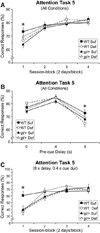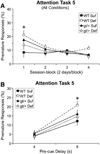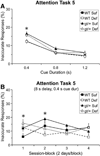Dietary and genetic manipulations of folate metabolism differentially affect neocortical functions in mice
- PMID: 23684804
- PMCID: PMC5096640
- DOI: 10.1016/j.ntt.2013.05.002
Dietary and genetic manipulations of folate metabolism differentially affect neocortical functions in mice
Abstract
Converging evidence suggests that folate-mediated one-carbon metabolism may modulate cognitive functioning throughout the lifespan, but few studies have directly tested this hypothesis. This study examined the separate and combined effects of dietary and genetic manipulations of folate metabolism on neocortical functions in mice, modeling a common genetic variant in the MTHFD1 gene in humans. Mutant (Mthfd1(gt/+)) and wildtype (WT) male mice were assigned to a folate sufficient or deficient diet at weaning and continued on these diets throughout testing on a series of visual attention tasks adapted from the 5-choice serial reaction time task. WT mice on a deficient diet exhibited impulsive responding immediately following a change in task parameters that increased demands on attention and impulse control, and on trials following an error. This pattern of findings indicates a heightened affective response to stress and/or an inability to regulate negative emotions. In contrast, Mthfd1(gt/+) mice (regardless of diet) exhibited attentional dysfunction and a blunted affective response to committing an error. The Mthfd1(gt/+) mice also showed significantly decreased expression levels for genes encoding choline dehydrogenase and the alpha 7 nicotinic cholinergic receptor. The effects of the MTHFD1 mutation were less pronounced when combined with a deficient diet, suggesting a compensatory mechanism to the combined genetic and dietary perturbation of folate metabolism. These data demonstrate that common alterations in folate metabolism can produce functionally distinct cognitive and affective changes, and highlight the importance of considering genotype when making dietary folate recommendations.
Keywords: Affect; Attention; Folate; Impulsivity; MTHFD1.
Copyright © 2013. Published by Elsevier Inc.
Conflict of interest statement
statement There are no conflicts of interest to report.
Figures






References
-
- Alpert JE, Mischoulon D, Rubenstein GE, Bottonari K, Nierenberg AA, Fava M. Folinic acid (leucovorin) as an adjunctive treatment for SSRI-refractory depression. Ann Clin Psychiatry. 2002;14:33–38. - PubMed
-
- Ariogul S, Cankurtaran M, Dagli N, Khalil M, Yavuz B. Vitamin B12, folate, homocysteine and dementia: are they really related? Arch Gerontol Geriatr. 2005;40:139–146. - PubMed
-
- Arnsten AF, Li BM. Neurobiology of executive functions: catecholamine influences on prefrontal cortical functions. Biol Psychiatry. 2005;57:1377–1384. - PubMed
-
- Bachevalier J, Botez MI. Avoidance behavior in folate-deficient rats. Tohoku J Exp Med. 1978;126:111–116. - PubMed
-
- Bachevalier J, Joyal C, Botez MI. Blood thiamine and blood folate levels. A comparative study in control, alcoholic and folate-deficient subjects. Int J Vitam Nutr Res. 1981;51:205–210. - PubMed
Publication types
MeSH terms
Substances
Grants and funding
LinkOut - more resources
Full Text Sources
Other Literature Sources
Medical
Molecular Biology Databases
Miscellaneous

